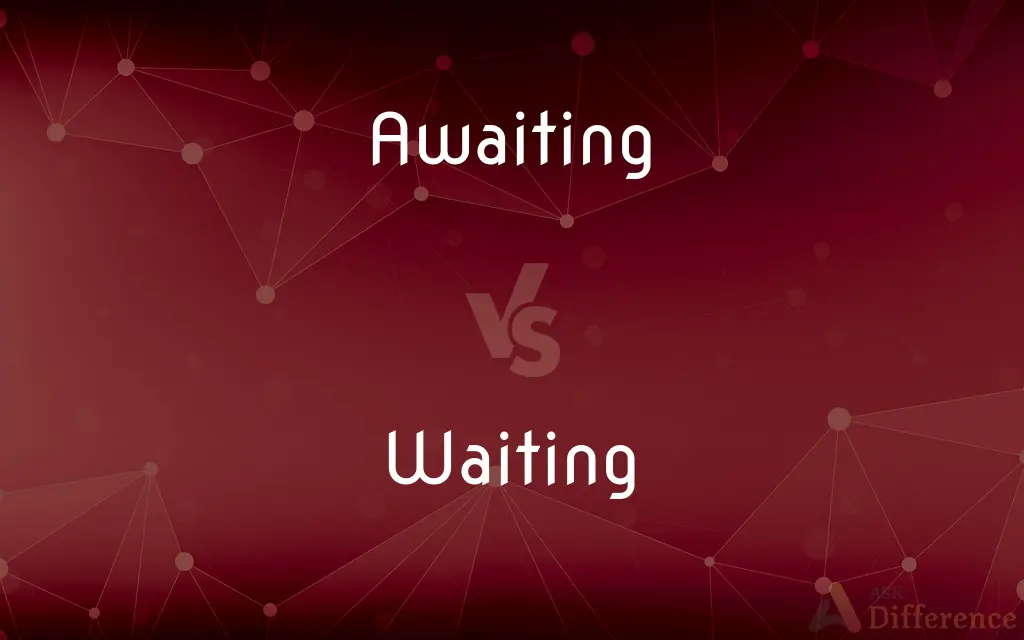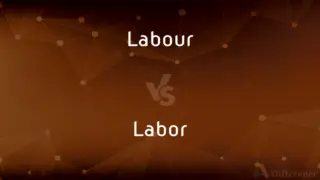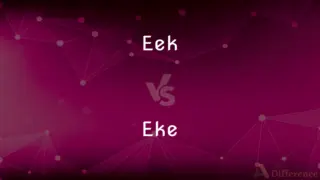Awaiting vs. Waiting — What's the Difference?
Edited by Tayyaba Rehman — By Fiza Rafique — Updated on October 10, 2023
Awaiting implies expectation and is often used without a preposition, while Waiting generally requires a preposition or additional context, denoting a passive state.

Difference Between Awaiting and Waiting
Table of Contents
ADVERTISEMENT
Key Differences
Diving into the nuanced world of English language usage, Awaiting and Waiting can be dissected for their subtle distinctions. Awaiting tends to convey an element of expectation and is typically used without a following preposition. This absence of a preposition after Awaiting gives it a slightly more formal tone and tends to be utilized in written English or more structured communication.
Conversely, the term Waiting does incorporate a preposition, often used in the format of “waiting for.” The construct “waiting for” implies a more passive state and tends to be prevalent in casual speech and everyday English. Whereas Awaiting carries a sense of active expectancy, Waiting seems to carry a bit of patience or passivity within its use, indicating an unassertive lingering until an event occurs.
Digging deeper into syntactical nuances, Awaiting usually anticipates an object directly afterward, being transitive. For example, “She is awaiting your reply.” On the other hand, Waiting necessitates an additional word or preposition to guide its object, as seen in, “He is waiting for the bus,” thereby providing an additional layer of complexity to its utilization and making it slightly less direct than Awaiting.
In a contextual scenario, the choice between Awaiting and Waiting can be reflective of the desired tonality in communication. Awaiting, with its directness and somewhat formal appeal, is commonly found in professional correspondence or environments where the language leans towards being official or slightly elevated in formality.
Conversely, Waiting, with its need for a preposition and less formal air, finds its place in informal discussions, casual conversations, and environments where language is used in a more relaxed and unceremonious manner. Both terms, although interchangeable in many scenarios, bring subtle differences to the foreground, emphasizing the rich, layered nature of language use.
ADVERTISEMENT
Comparison Chart
Preposition Requirement
Does not require a preposition
Typically requires a preposition
Formality
Tends to be more formal
Is often more casual
Transitivity
Is transitive and directly anticipates an object
Requires an additional word or preposition
Tone
May convey a stronger sense of expectation
May imply a passive or patient state
Common Usage
More common in written and formal English
More prevalent in casual, everyday conversation
Compare with Definitions
Awaiting
Awaiting directly anticipates an object, without a preposition.
The soldiers are awaiting orders.
Waiting
Waiting signifies being in a state of pause until an event occurs.
She is waiting for her coffee to cool down.
Awaiting
Awaiting implies being in expectation of something.
The team is eagerly awaiting your feedback.
Waiting
Waiting indicates a temporary halt in action or movement.
The players are waiting on the field.
Awaiting
Awaiting may suggest a slightly formal or structured tone.
I am awaiting your prompt response.
Waiting
Waiting requires a preposition or additional word to introduce its object.
The audience is waiting for the show to begin.
Awaiting
Awaiting communicates a state of expectancy.
The city is anxiously awaiting the storm’s arrival.
Waiting
The act of remaining inactive or stationary.
Awaiting
Awaiting means being ready for an upcoming event or action.
The actors are awaiting their cue to enter the stage.
Waiting
A period of time spent waiting.
Awaiting
Awaiting (Korean: 민우씨 오는날; RR: Minwussi Oneunnal; lit. "The Day Min-woo Arrives") is a 2014 South Korean short film written and directed by Kang Je-gyu, starring Moon Chae-won and Go Soo.It is one of four short films comprising Beautiful 2014, the third annual omnibus project commissioned by Chinese online platform Youku Tudou and the Hong Kong International Film Festival.
Waiting
Present participle of wait
Your guest has been waiting for you.
Waiting for something to happen is part of the job.
They hurried into the waiting car.
Awaiting
To wait for.
Waiting
(obsolete) Watching.
Awaiting
To be kept as ready for
A contract awaiting signature.
Waiting
The act of staying or remaining in expectation.
Awaiting
To be in store for
Death awaits us all.
Waiting
Attendance, service.
Awaiting
To be in store
A busy day awaits.
Waiting
The act of waiting (remaining inactive in one place while expecting something);
The wait was an ordeal for him
Awaiting
Present participle of await
Waiting
Being and remaining ready and available for use;
Waiting cars and limousines lined the curb
Found her mother waiting for them
An impressive array of food ready and waiting for the guests
Military forces ready and waiting
Waiting
Waiting often conveys a sense of patience or passive lingering.
He is waiting in line to purchase tickets.
Waiting
Waiting can imply a delay or postponement.
The meeting is waiting for the manager’s arrival.
Common Curiosities
Is Awaiting more formal than Waiting?
Generally, yes. Awaiting may convey a more formal or structured tone compared to Waiting.
Do both terms convey a sense of expectation?
Yes, but Awaiting often implies a stronger sense of expectation than Waiting.
Can Waiting be used without a preposition?
It is commonly used with a preposition (e.g., waiting for), unlike Awaiting which doesn’t require one.
Are Awaiting and Waiting interchangeable?
They can be, but Awaiting often implies expectation without a preposition, while Waiting typically requires a preposition.
Is Awaiting transitive?
Yes, Awaiting is transitive and directly anticipates an object.
Is Waiting suitable for formal correspondence?
It can be used, but Awaiting might be preferred for a more formal tone.
Can both terms be used in professional environments?
Yes, but Awaiting is often favored in formal or professional communication.
How do they relate in terms of activeness?
Awaiting might imply a more active form of expectation, while Waiting can be more passive.
Can I use Awaiting in informal writing?
Yes, but it may lend a slightly formal tone to the communication.
Can I say "Awaiting for your reply"?
No, use “Awaiting your reply” as Awaiting does not require a preposition.
Which term implies more patience?
Waiting might imply more patience or a passive state compared to Awaiting.
Can Awaiting be used in casual conversation?
It can, but it might come across as formal or structured.
Which term is commonly used in everyday speech?
Waiting is more commonly used in casual, everyday conversation.
Can Waiting directly anticipate an object?
No, Waiting typically requires a preposition or additional word to introduce its object.
How do they function syntactically?
Awaiting is transitive and doesn’t require a preposition, while Waiting is often followed by a preposition like “for.”
Share Your Discovery

Previous Comparison
Labour vs. Labor
Next Comparison
Eek vs. EkeAuthor Spotlight
Written by
Fiza RafiqueFiza Rafique is a skilled content writer at AskDifference.com, where she meticulously refines and enhances written pieces. Drawing from her vast editorial expertise, Fiza ensures clarity, accuracy, and precision in every article. Passionate about language, she continually seeks to elevate the quality of content for readers worldwide.
Edited by
Tayyaba RehmanTayyaba Rehman is a distinguished writer, currently serving as a primary contributor to askdifference.com. As a researcher in semantics and etymology, Tayyaba's passion for the complexity of languages and their distinctions has found a perfect home on the platform. Tayyaba delves into the intricacies of language, distinguishing between commonly confused words and phrases, thereby providing clarity for readers worldwide.














































